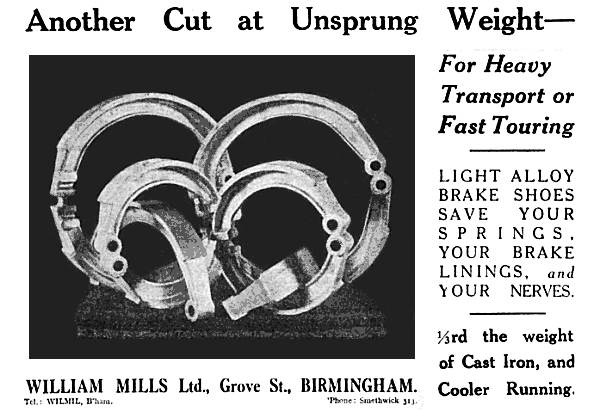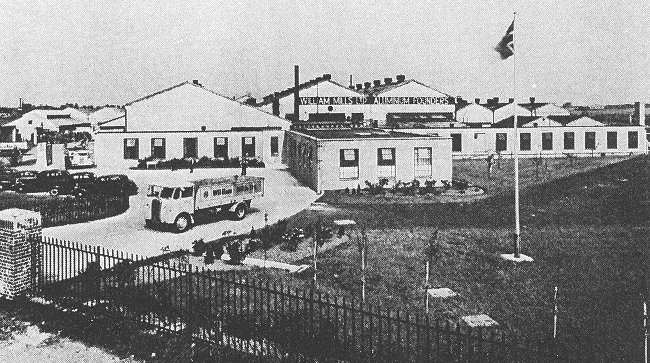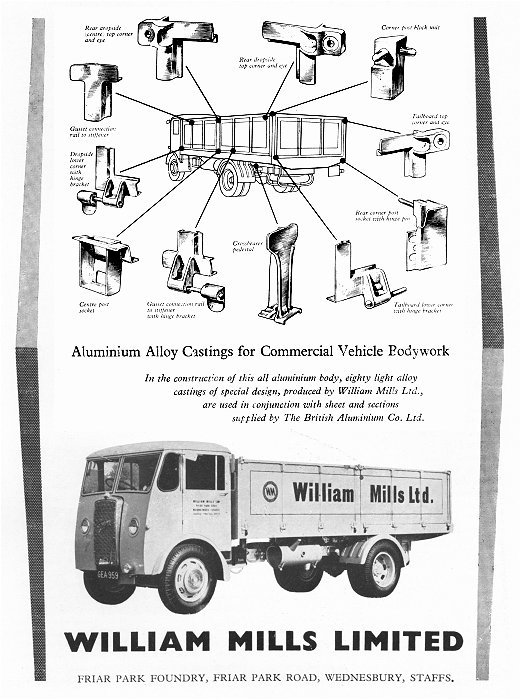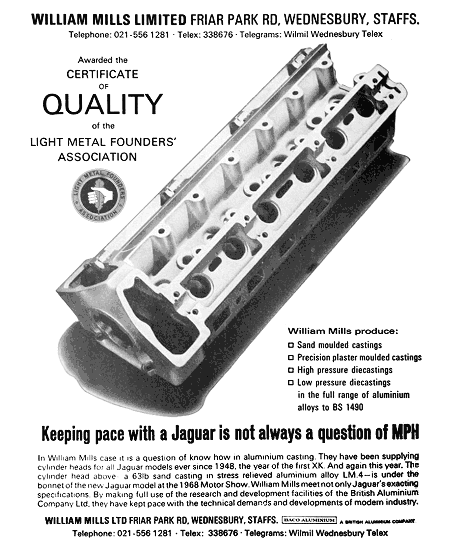|
William Mills Limited
A once familiar sight in Friar Park Road, for over fifty
years, was the factory of William Mills Limited,
aluminium founders.
William Mills started the business
in the 1890s at Sunderland, making ships’ gear of all
kinds, including iron castings produced in the firm’s
foundry. By 1898 an aluminium foundry had been added to
the site, which must have been one of the first in the
country. Amongst other things the foundry produced
castings for the Mills putter, considered an essential
buy for enthusiastic golfers.
The firm soon started to produce
castings for the up and coming car industry, and had a
stand at the 1903 Automobile Show at Crystal Palace. In
the same year the firm became a limited company. At the
time, the motor car industry in the West Midlands was
rapidly developing, and possibly because of this,
William Mills decided to relocate the business to the
Midlands, and opened a foundry in Grove Street, on the
border of Birmingham and Smethwick. |

An advert from 1923.
|
The new foundry began turning out a
large number of castings both in iron and aluminium alloy,
mainly for the motor industry. The firm also made cooking
utensils, and a popular type of roller skate which had
aluminium wheels. By 1914 there were around three hundred
employees.
In the First World War the foundry
produced lightweight castings for the newly formed aircraft
industry which rapidly grew as part of the war effort. At
this time, William Mills invented a terrible weapon, the
Mills hand grenade, which was not produced at the foundry,
but by the Mills Munitions Factory in Birmingham and by a
host of contractors. William Mills opened the munitions
factory in 1915, and around 75,000,000 grenades were
produced. Due to his contribution to the nation’s armoury,
William Mills received a knighthood in 1922.
In the early 1920s, William Mills
Limited was acquired by The British Aluminium Company
Limited in order to extend their range of cast aluminium
products. The production of iron castings ceased, and from
then-on the firm concentrated on the production of aluminium
castings. |

Friar Park Works.
| New laboratories and an up-to-date heat treatment plant
were built and the firm became one of the leading producers
of aluminium castings. Initially traditional sand casting
continued to be used, in which a fresh sand mould had to be
produced for every casting. In order to streamline
production, die casting was introduced in which an
accurately machined cast-iron mould could be used many
thousands of times before replacement. It was one of the
first die casting foundries in the country. Products
included aluminium alloy wheels, and castings for internal
combustion engines. |

An advert from the mid 1950s.
|

An advert from 1968. |
Sir William Mills also invented a
patent instantaneous engaging and disengaging gear for
ships, and a telescopic walking stick seat. He died in 1932
and the business continued to thrive. At the start of World
War 2 the firm came under government control and was
required to produce medium and large aero engine castings. A
new foundry opened in Friar Park Road, Wednesbury which was
designed and managed by the firm. Products included the
aluminium blocks for the Merlin engine used in the Spitfire.
After the war the company took over
Friar Park Foundry from the government and sold-off the old
works in Grove Street. The new factory had been designed for
the production of sand castings of a particular type, but
changes had to be made to permit the production of a much
wider range of castings of different types and sizes, and
also die castings which would form a large proportion of the
output. |
|
As well as the traditional gravity die
castings, high-pressure die castings were introduced, using
new machines which could produce castings of up to 10lbs in
weight, in great rapidity, with thinner sections and of
great accuracy. Some of the castings were so accurate that
the need for subsequent machining was eliminated.
The process was again improved so that
precision castings of up to a hundredweight or more could be
produced, including engine blocks, and even parts for guided
missiles.
Sadly the factory closed some years
ago, and all traces have now disappeared. |
|
 |
Return to the
previous page |
|